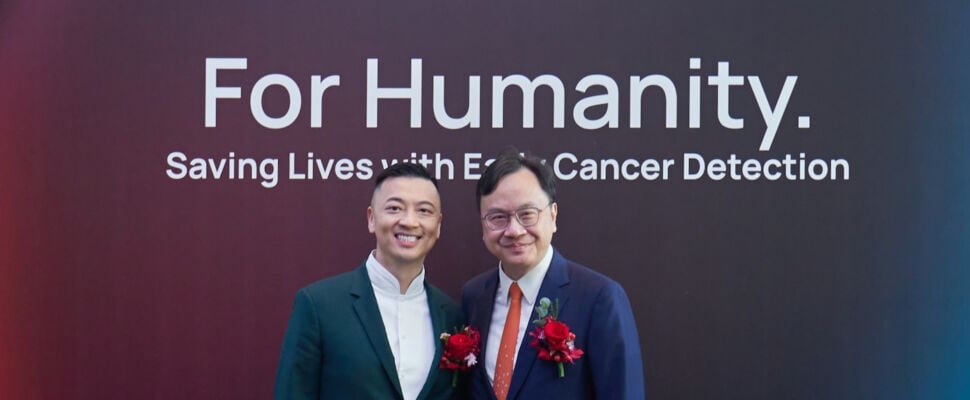Insighta, formed this year as a 50/50 joint venture between genomics-focused outfit Prenetics and one of the city’s most feted scientific sons, Professor Dennis Lo, is aiming to change the face of cancer care via widespread early detection.
While early detection is widely recognised as crucial to enhancing cancer survival rates, the currently available tools are not fit for purpose. Global guidelines only encompass five specific types of cancer, and there are no recommended early detection screenings for the cancers which account for almost 71 percent of the 10 million global cancer-related deaths each year. Technologies which can effectively address this disparity stand to access an enormous market, with the demand for early detection cancer screenings projected to translate into 30 million in tests in Asia alone by 2030 and a USD six billion market size.
Enter Professor Dennis Lo. His team at the Chinese University of Hong Kong (CUHK)’s Centre for Novostics (novel diagnostics), funded by the Hong Kong government’s InnoHK Initiative, have been working on a new field known as ‘fragmentomics,’ which has significant potential in cancer screening applications.
Professor Lo explains the technology thusly: “The DNA inside a cell are long molecules within the chromosome, but in the blood they are very short, and this is due to the longer molecules being cut into these smaller ones. We can identify which disease a person has based on where the molecule is cut. For a simple comparison, if you get your hair cut and the hairdresser uses different scissors, we would be able to tell which disease you have based on the cut marks of each scissor.”
It is this tech, now known as ‘FRAGMA’ behind the USD 200 million transaction with Prenetics to create a new company, Insighta; a tie-up which represents the largest private life sciences deal in Hong Kong’s history and one of the biggest in the wider Asia-Pacific region. Insighta aims to create a simple blood draw that can detect multiple types of cancers at their early stages. Significantly, the company also hopes to launch its tests at a price point of USD 200 – significantly less than the current USD 950 average – which could have a big impact on its uptake in developing markets.
Our collective experience positions us well to ensure that the remarkable potential of the FRAGMA technology reaches its full fruition
Danny Yeung, CEO and co-founder, Prenetics, Insighta
Questioned on how Insighta’s technology and strategy places it ahead of its competitors, Prenetics CEO, co-founder, and serial entrepreneur Danny Yeung is bullish. “I am confident in our ability to deliver a superior product with a stronger value proposition compared to the current status quo driven by larger competitors,” he proclaims, highlighting the streamlined workflow, expert insight, and cost-effectiveness that the new company is coming to market with.
“The workflow for FRAGMA is simple random sequencing without bisulfite conversion, explains Yeung. “The wet-lab analysis of FRAGMA is the same as the one used for non-invasive prenatal testing (NIPT), a field which Professor Lo pioneered. Millions of NIPTs are performed every year in many different countries. As the test does not require bisulfite conversion, it has a shorter turn-around time, more stable performance, and significantly lower cost than the bisulfite-based tests used by out competitors.” He adds that the product’s low price will allow it to be “globally adopted and truly impactful, benefitting millions of individuals worldwide.”
Insighta plans to launch a multi-country 5000-patient clinical trial of its Presight test in early 2024, initially focusing on liver and lung cancer – significant health burdens in China and across Asia – before moving on to a multi-cancer early detection version capable of identifying over ten different cancers in 2027.
Both Professor Lo and Yeung are confident that, by drawing on their previous experiences, Insighta can navigate the choppy waters of bringing a breakthrough new health technology to market.
For his part, Lo possesses a wealth of experience in the realm of early cancer detection as the co-founder of Cirina, which was subsequently acquired by Grail for USD 300m, before Illumina then acquired Grail for USD 8bn. However, his main claim to fame is his groundbreaking work in NIPT. This technology, developed in his lab and launched in 2011, has since become the global standard in prenatal care, benefiting over 15 million pregnant women annually across more than 90 countries. “Leveraging Professor Lo’s extensive expertise and proven track record, we believe that FRAGMA has the potential to become the new standard of care for early cancer detection within the next five to ten years,” proclaims Yeung.
On the commercial side of things, Yeung is one of Hong Kong’s leading entrepreneurs, with historic ventures in fields as diverse as desserts and furniture, but is perhaps best known for selling his group buying website UBuyIBuy.com to Groupon just six months after founding it, with no prior e-commerce experience. Prenetics – the genomics-driven health sciences firm he co-founded in 2014 – pivoted rapidly during the COVID-19 pandemic from a DNA-kit maker to Hong Kong’s leading COVID test provider and became the first Hong Kong-based unicorn to list on NASDAQ in 2021.
Yeung trumpets the importance of a “multi-faceted approach” in ensuring scientific innovation can lead to success on the market. “Beyond the scientific innovation itself, factors such as market awareness, adoption strategies, and efficient execution play pivotal roles,” states Yeung. “This is where our strategic leadership at Prenetics comes into play. Our collective experience positions us well to ensure that the remarkable potential of the FRAGMA technology reaches its full fruition, ultimately making a significant and positive impact on early cancer detection and patient care.”
While the long-term impact of this new venture on changing the early cancer detection paradigm remains to be seen, Insighta will feel confident that – with Lo and Yeung at the helm – they are well placed for both scientific and commercial success.


